Research Project: Social Media Marketing Impact on Tourism Buying
VerifiedAdded on 2024/05/21
|31
|6091
|351
Report
AI Summary
This research project evaluates the influence of social media marketing on consumer buying behavior within the travel and tourism sector. It explores how social media platforms shape consumer perceptions and purchasing decisions related to travel products and services. The study employs both qualitative and quantitative data collection methods, including surveys of social media users and non-users, to analyze the impact of online marketing on ticket booking and overall consumer satisfaction. The research also reviews existing literature to understand the evolving role of social media in the tourism industry and its effects on consumer engagement and brand loyalty. This comprehensive analysis aims to provide insights into how travel and tourism organizations can leverage social media to enhance their marketing strategies and better cater to the changing needs and preferences of consumers.
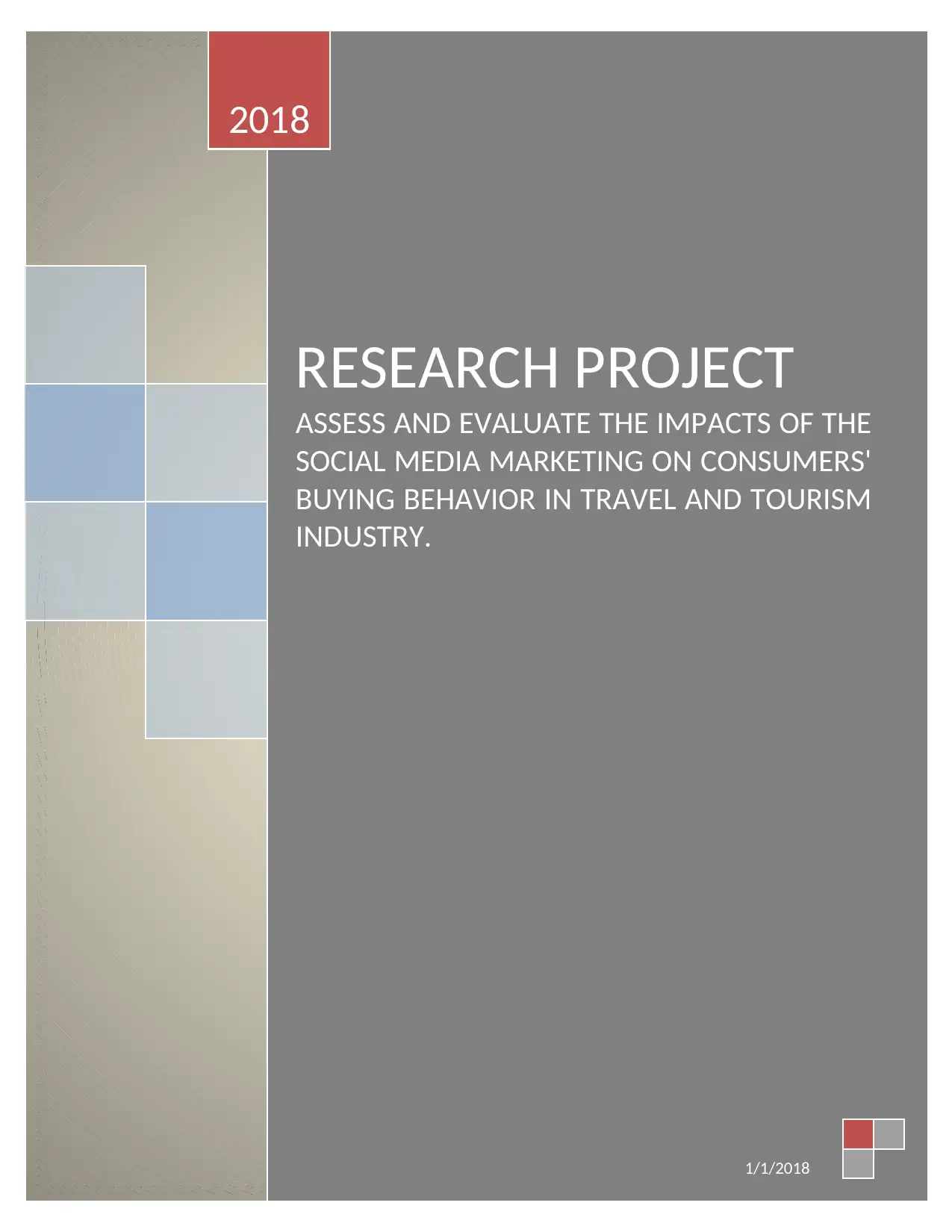
RESEARCH PROJECT
ASSESS AND EVALUATE THE IMPACTS OF THE
SOCIAL MEDIA MARKETING ON CONSUMERS'
BUYING BEHAVIOR IN TRAVEL AND TOURISM
INDUSTRY.
2018
1/1/2018
ASSESS AND EVALUATE THE IMPACTS OF THE
SOCIAL MEDIA MARKETING ON CONSUMERS'
BUYING BEHAVIOR IN TRAVEL AND TOURISM
INDUSTRY.
2018
1/1/2018
Paraphrase This Document
Need a fresh take? Get an instant paraphrase of this document with our AI Paraphraser
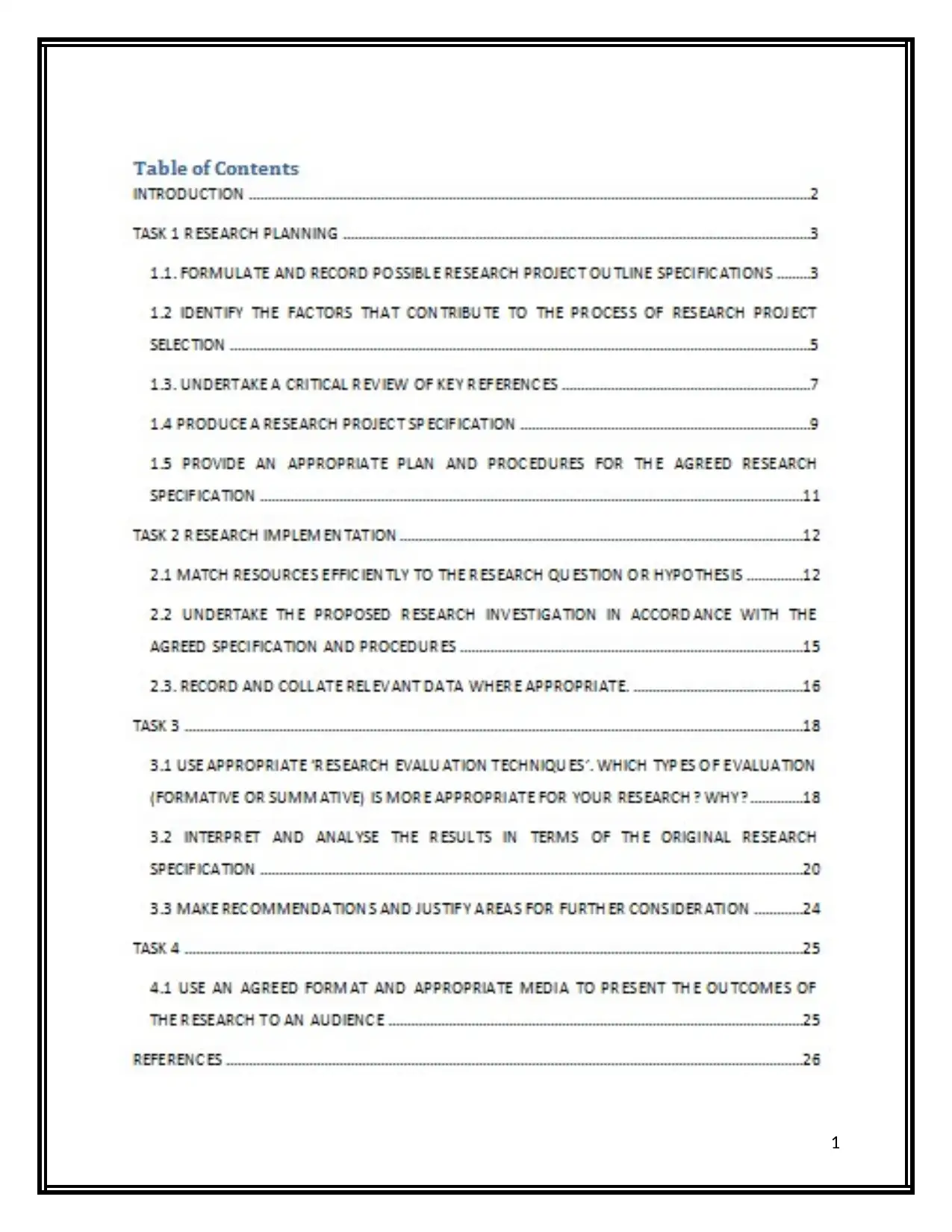
1
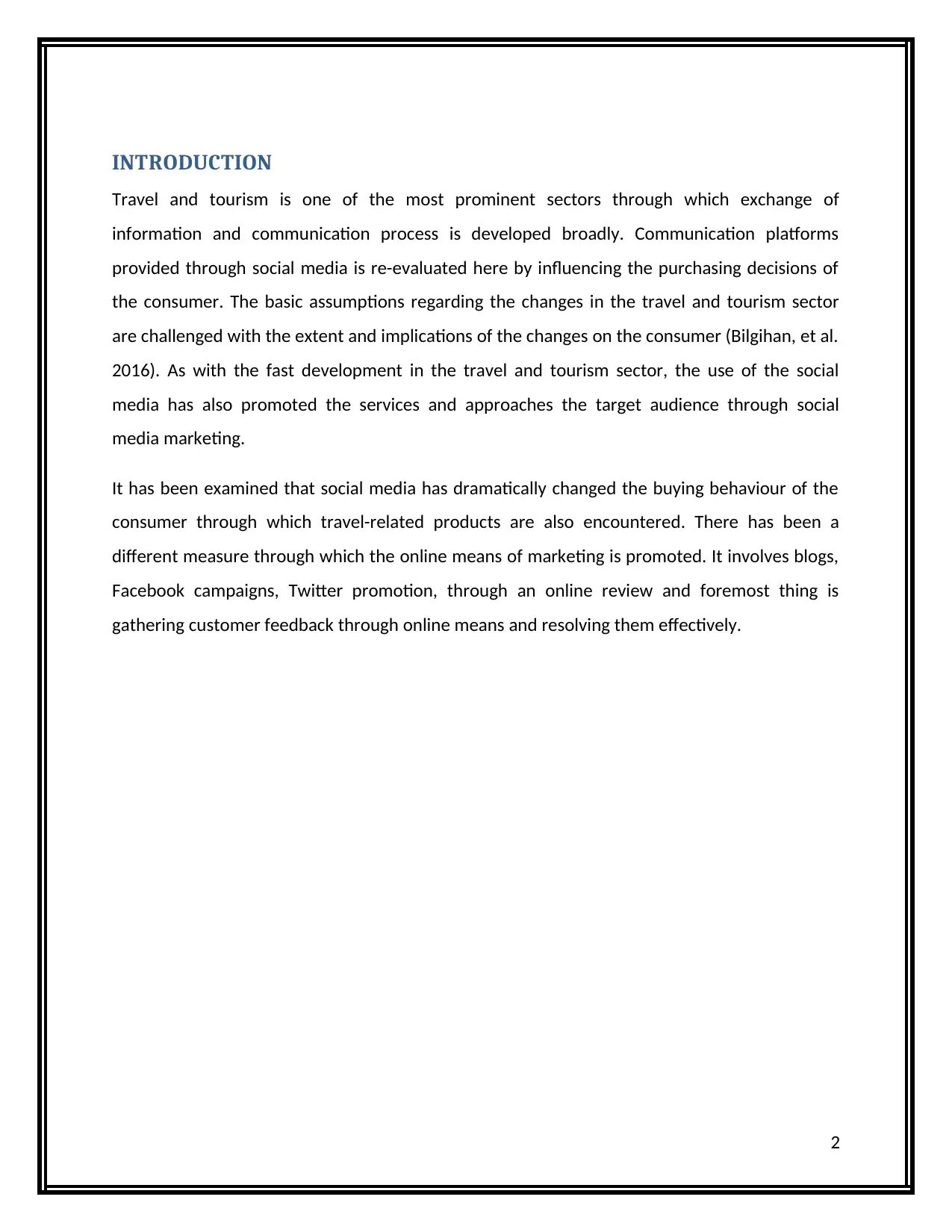
INTRODUCTION
Travel and tourism is one of the most prominent sectors through which exchange of
information and communication process is developed broadly. Communication platforms
provided through social media is re-evaluated here by influencing the purchasing decisions of
the consumer. The basic assumptions regarding the changes in the travel and tourism sector
are challenged with the extent and implications of the changes on the consumer (Bilgihan, et al.
2016). As with the fast development in the travel and tourism sector, the use of the social
media has also promoted the services and approaches the target audience through social
media marketing.
It has been examined that social media has dramatically changed the buying behaviour of the
consumer through which travel-related products are also encountered. There has been a
different measure through which the online means of marketing is promoted. It involves blogs,
Facebook campaigns, Twitter promotion, through an online review and foremost thing is
gathering customer feedback through online means and resolving them effectively.
2
Travel and tourism is one of the most prominent sectors through which exchange of
information and communication process is developed broadly. Communication platforms
provided through social media is re-evaluated here by influencing the purchasing decisions of
the consumer. The basic assumptions regarding the changes in the travel and tourism sector
are challenged with the extent and implications of the changes on the consumer (Bilgihan, et al.
2016). As with the fast development in the travel and tourism sector, the use of the social
media has also promoted the services and approaches the target audience through social
media marketing.
It has been examined that social media has dramatically changed the buying behaviour of the
consumer through which travel-related products are also encountered. There has been a
different measure through which the online means of marketing is promoted. It involves blogs,
Facebook campaigns, Twitter promotion, through an online review and foremost thing is
gathering customer feedback through online means and resolving them effectively.
2
⊘ This is a preview!⊘
Do you want full access?
Subscribe today to unlock all pages.

Trusted by 1+ million students worldwide
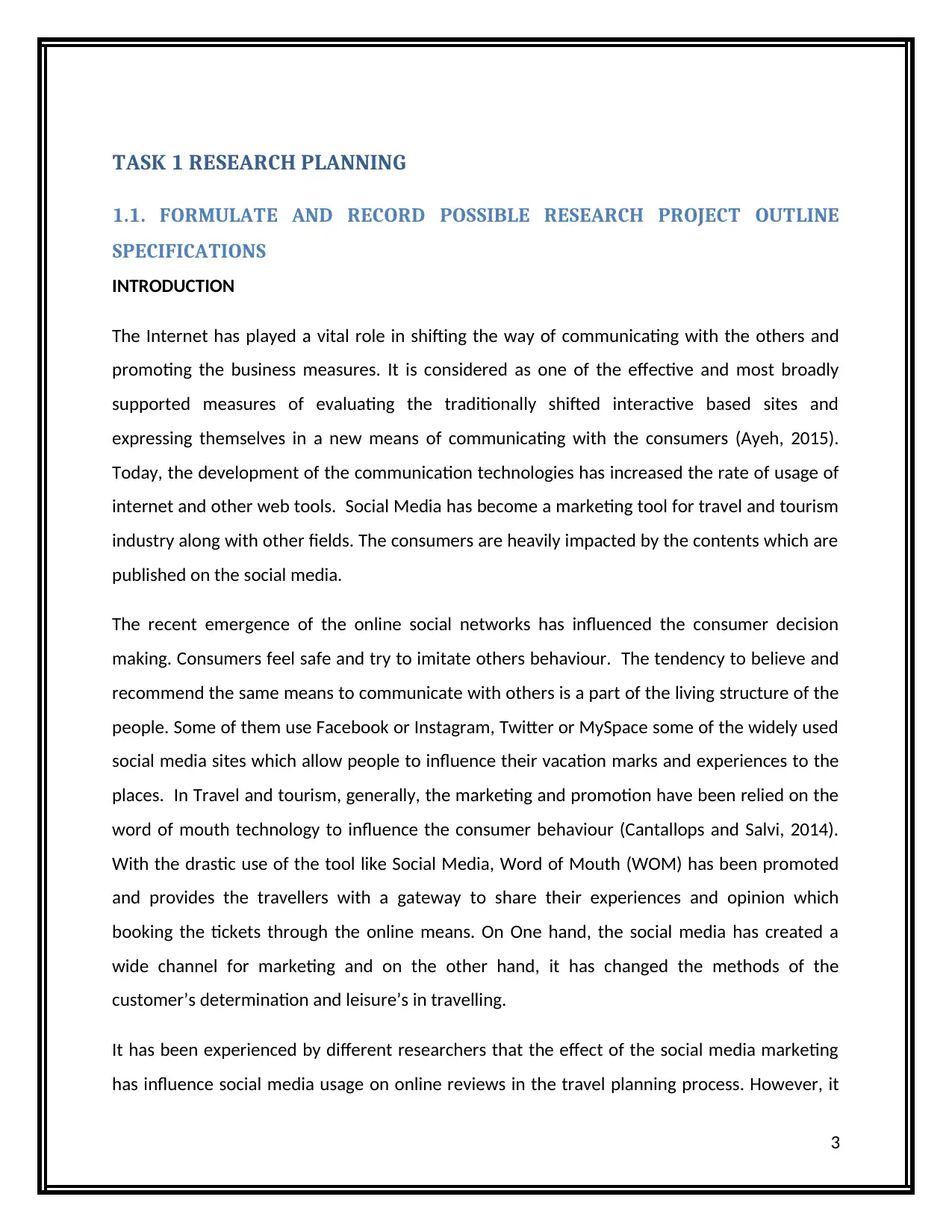
TASK 1 RESEARCH PLANNING
1.1. FORMULATE AND RECORD POSSIBLE RESEARCH PROJECT OUTLINE
SPECIFICATIONS
INTRODUCTION
The Internet has played a vital role in shifting the way of communicating with the others and
promoting the business measures. It is considered as one of the effective and most broadly
supported measures of evaluating the traditionally shifted interactive based sites and
expressing themselves in a new means of communicating with the consumers (Ayeh, 2015).
Today, the development of the communication technologies has increased the rate of usage of
internet and other web tools. Social Media has become a marketing tool for travel and tourism
industry along with other fields. The consumers are heavily impacted by the contents which are
published on the social media.
The recent emergence of the online social networks has influenced the consumer decision
making. Consumers feel safe and try to imitate others behaviour. The tendency to believe and
recommend the same means to communicate with others is a part of the living structure of the
people. Some of them use Facebook or Instagram, Twitter or MySpace some of the widely used
social media sites which allow people to influence their vacation marks and experiences to the
places. In Travel and tourism, generally, the marketing and promotion have been relied on the
word of mouth technology to influence the consumer behaviour (Cantallops and Salvi, 2014).
With the drastic use of the tool like Social Media, Word of Mouth (WOM) has been promoted
and provides the travellers with a gateway to share their experiences and opinion which
booking the tickets through the online means. On One hand, the social media has created a
wide channel for marketing and on the other hand, it has changed the methods of the
customer’s determination and leisure’s in travelling.
It has been experienced by different researchers that the effect of the social media marketing
has influence social media usage on online reviews in the travel planning process. However, it
3
1.1. FORMULATE AND RECORD POSSIBLE RESEARCH PROJECT OUTLINE
SPECIFICATIONS
INTRODUCTION
The Internet has played a vital role in shifting the way of communicating with the others and
promoting the business measures. It is considered as one of the effective and most broadly
supported measures of evaluating the traditionally shifted interactive based sites and
expressing themselves in a new means of communicating with the consumers (Ayeh, 2015).
Today, the development of the communication technologies has increased the rate of usage of
internet and other web tools. Social Media has become a marketing tool for travel and tourism
industry along with other fields. The consumers are heavily impacted by the contents which are
published on the social media.
The recent emergence of the online social networks has influenced the consumer decision
making. Consumers feel safe and try to imitate others behaviour. The tendency to believe and
recommend the same means to communicate with others is a part of the living structure of the
people. Some of them use Facebook or Instagram, Twitter or MySpace some of the widely used
social media sites which allow people to influence their vacation marks and experiences to the
places. In Travel and tourism, generally, the marketing and promotion have been relied on the
word of mouth technology to influence the consumer behaviour (Cantallops and Salvi, 2014).
With the drastic use of the tool like Social Media, Word of Mouth (WOM) has been promoted
and provides the travellers with a gateway to share their experiences and opinion which
booking the tickets through the online means. On One hand, the social media has created a
wide channel for marketing and on the other hand, it has changed the methods of the
customer’s determination and leisure’s in travelling.
It has been experienced by different researchers that the effect of the social media marketing
has influence social media usage on online reviews in the travel planning process. However, it
3
Paraphrase This Document
Need a fresh take? Get an instant paraphrase of this document with our AI Paraphraser
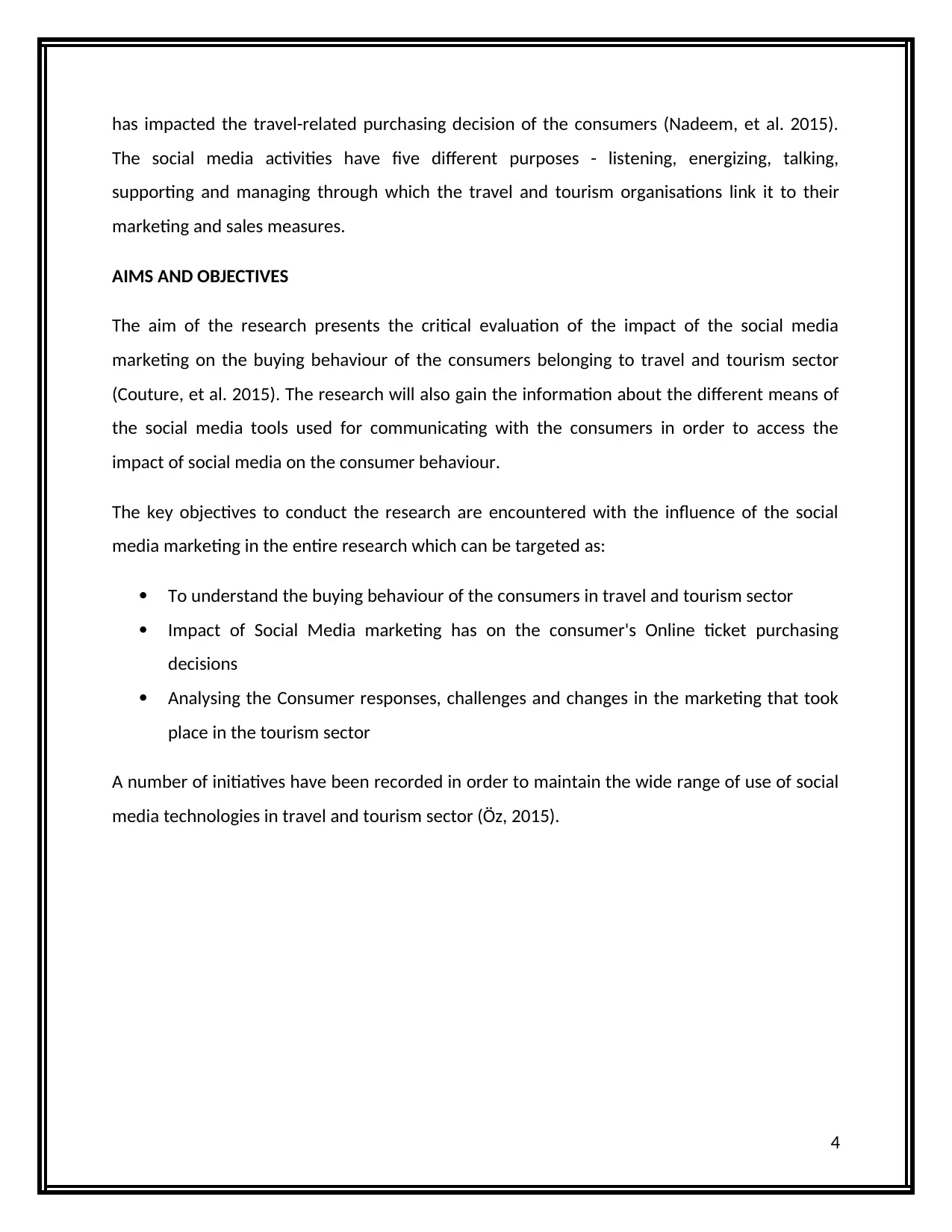
has impacted the travel-related purchasing decision of the consumers (Nadeem, et al. 2015).
The social media activities have five different purposes - listening, energizing, talking,
supporting and managing through which the travel and tourism organisations link it to their
marketing and sales measures.
AIMS AND OBJECTIVES
The aim of the research presents the critical evaluation of the impact of the social media
marketing on the buying behaviour of the consumers belonging to travel and tourism sector
(Couture, et al. 2015). The research will also gain the information about the different means of
the social media tools used for communicating with the consumers in order to access the
impact of social media on the consumer behaviour.
The key objectives to conduct the research are encountered with the influence of the social
media marketing in the entire research which can be targeted as:
To understand the buying behaviour of the consumers in travel and tourism sector
Impact of Social Media marketing has on the consumer's Online ticket purchasing
decisions
Analysing the Consumer responses, challenges and changes in the marketing that took
place in the tourism sector
A number of initiatives have been recorded in order to maintain the wide range of use of social
media technologies in travel and tourism sector (Öz, 2015).
4
The social media activities have five different purposes - listening, energizing, talking,
supporting and managing through which the travel and tourism organisations link it to their
marketing and sales measures.
AIMS AND OBJECTIVES
The aim of the research presents the critical evaluation of the impact of the social media
marketing on the buying behaviour of the consumers belonging to travel and tourism sector
(Couture, et al. 2015). The research will also gain the information about the different means of
the social media tools used for communicating with the consumers in order to access the
impact of social media on the consumer behaviour.
The key objectives to conduct the research are encountered with the influence of the social
media marketing in the entire research which can be targeted as:
To understand the buying behaviour of the consumers in travel and tourism sector
Impact of Social Media marketing has on the consumer's Online ticket purchasing
decisions
Analysing the Consumer responses, challenges and changes in the marketing that took
place in the tourism sector
A number of initiatives have been recorded in order to maintain the wide range of use of social
media technologies in travel and tourism sector (Öz, 2015).
4
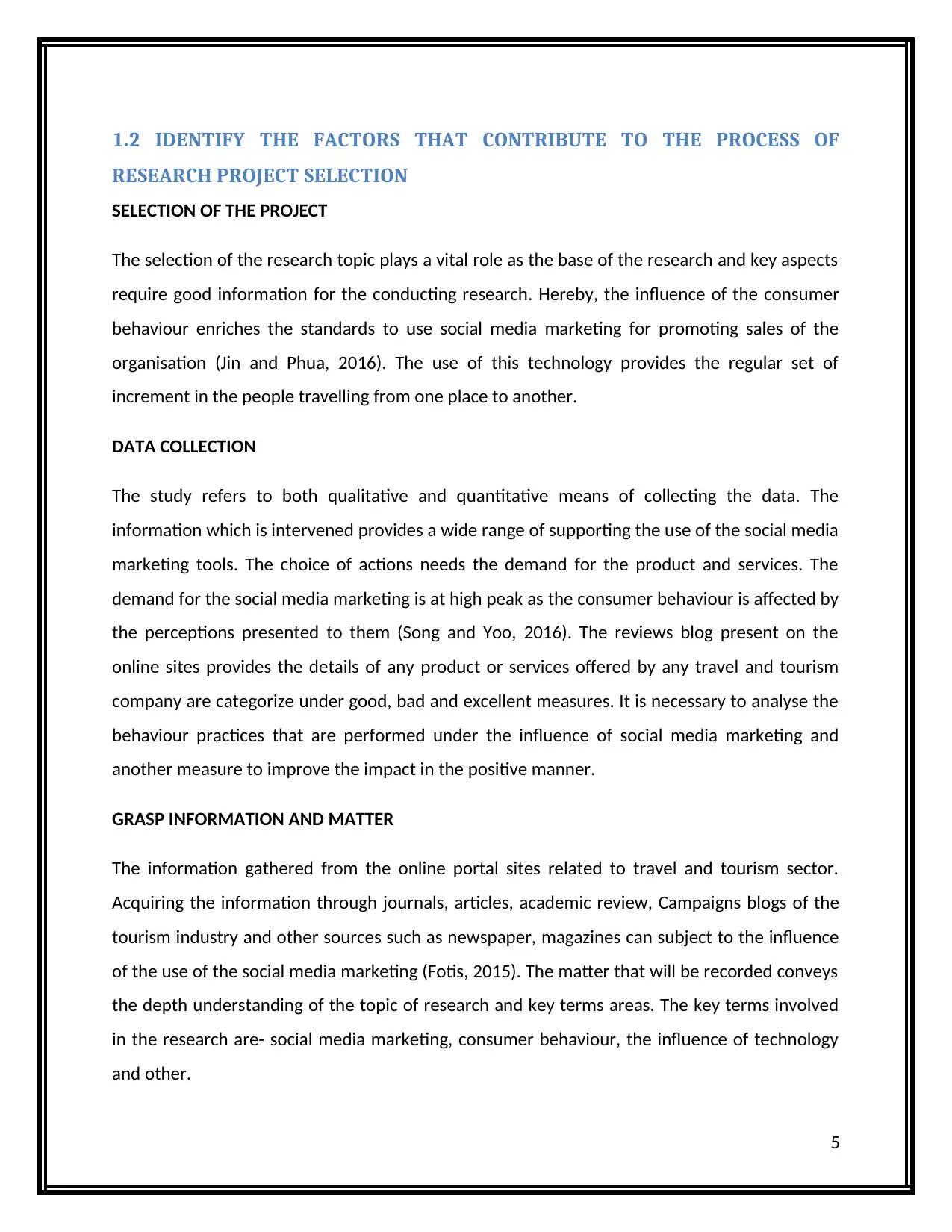
1.2 IDENTIFY THE FACTORS THAT CONTRIBUTE TO THE PROCESS OF
RESEARCH PROJECT SELECTION
SELECTION OF THE PROJECT
The selection of the research topic plays a vital role as the base of the research and key aspects
require good information for the conducting research. Hereby, the influence of the consumer
behaviour enriches the standards to use social media marketing for promoting sales of the
organisation (Jin and Phua, 2016). The use of this technology provides the regular set of
increment in the people travelling from one place to another.
DATA COLLECTION
The study refers to both qualitative and quantitative means of collecting the data. The
information which is intervened provides a wide range of supporting the use of the social media
marketing tools. The choice of actions needs the demand for the product and services. The
demand for the social media marketing is at high peak as the consumer behaviour is affected by
the perceptions presented to them (Song and Yoo, 2016). The reviews blog present on the
online sites provides the details of any product or services offered by any travel and tourism
company are categorize under good, bad and excellent measures. It is necessary to analyse the
behaviour practices that are performed under the influence of social media marketing and
another measure to improve the impact in the positive manner.
GRASP INFORMATION AND MATTER
The information gathered from the online portal sites related to travel and tourism sector.
Acquiring the information through journals, articles, academic review, Campaigns blogs of the
tourism industry and other sources such as newspaper, magazines can subject to the influence
of the use of the social media marketing (Fotis, 2015). The matter that will be recorded conveys
the depth understanding of the topic of research and key terms areas. The key terms involved
in the research are- social media marketing, consumer behaviour, the influence of technology
and other.
5
RESEARCH PROJECT SELECTION
SELECTION OF THE PROJECT
The selection of the research topic plays a vital role as the base of the research and key aspects
require good information for the conducting research. Hereby, the influence of the consumer
behaviour enriches the standards to use social media marketing for promoting sales of the
organisation (Jin and Phua, 2016). The use of this technology provides the regular set of
increment in the people travelling from one place to another.
DATA COLLECTION
The study refers to both qualitative and quantitative means of collecting the data. The
information which is intervened provides a wide range of supporting the use of the social media
marketing tools. The choice of actions needs the demand for the product and services. The
demand for the social media marketing is at high peak as the consumer behaviour is affected by
the perceptions presented to them (Song and Yoo, 2016). The reviews blog present on the
online sites provides the details of any product or services offered by any travel and tourism
company are categorize under good, bad and excellent measures. It is necessary to analyse the
behaviour practices that are performed under the influence of social media marketing and
another measure to improve the impact in the positive manner.
GRASP INFORMATION AND MATTER
The information gathered from the online portal sites related to travel and tourism sector.
Acquiring the information through journals, articles, academic review, Campaigns blogs of the
tourism industry and other sources such as newspaper, magazines can subject to the influence
of the use of the social media marketing (Fotis, 2015). The matter that will be recorded conveys
the depth understanding of the topic of research and key terms areas. The key terms involved
in the research are- social media marketing, consumer behaviour, the influence of technology
and other.
5
⊘ This is a preview!⊘
Do you want full access?
Subscribe today to unlock all pages.

Trusted by 1+ million students worldwide
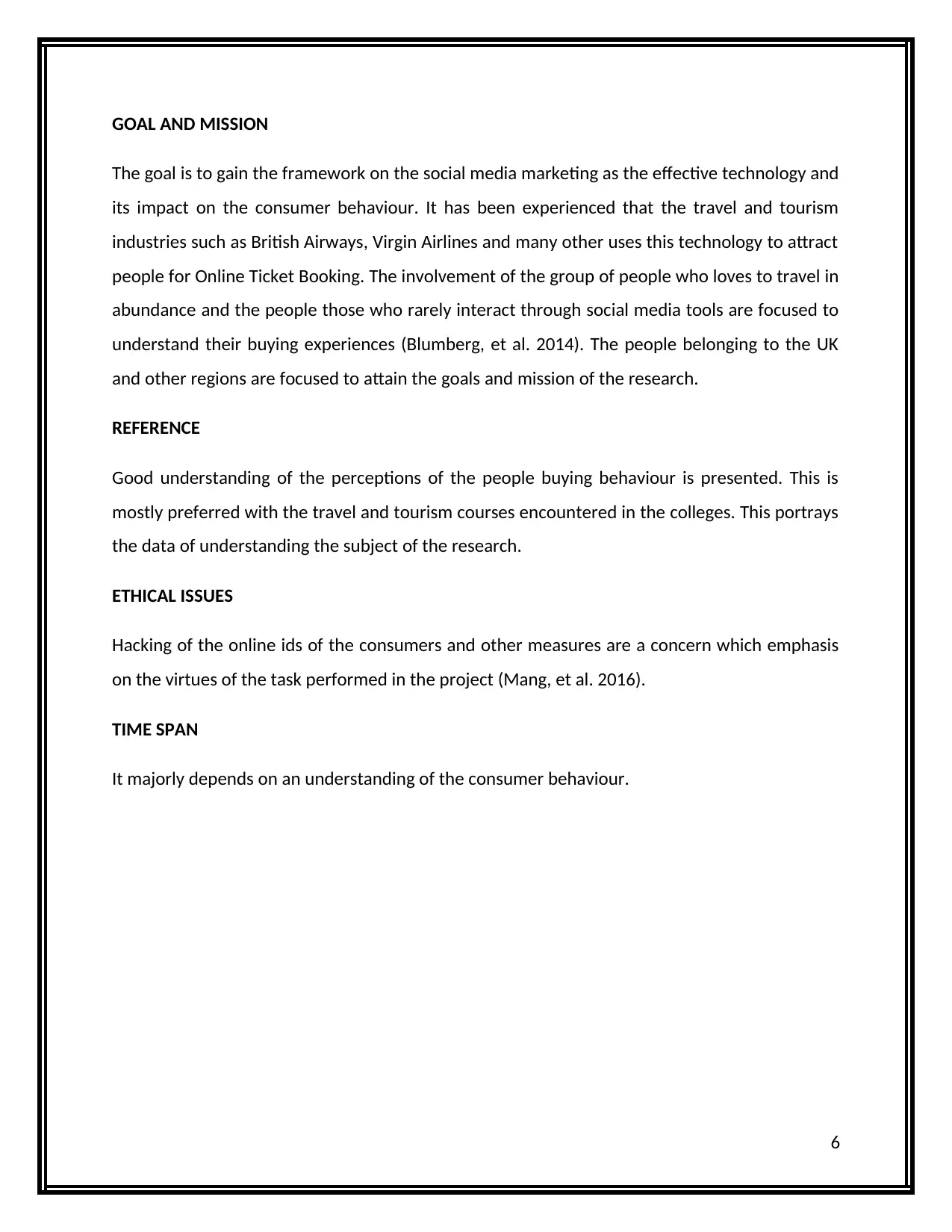
GOAL AND MISSION
The goal is to gain the framework on the social media marketing as the effective technology and
its impact on the consumer behaviour. It has been experienced that the travel and tourism
industries such as British Airways, Virgin Airlines and many other uses this technology to attract
people for Online Ticket Booking. The involvement of the group of people who loves to travel in
abundance and the people those who rarely interact through social media tools are focused to
understand their buying experiences (Blumberg, et al. 2014). The people belonging to the UK
and other regions are focused to attain the goals and mission of the research.
REFERENCE
Good understanding of the perceptions of the people buying behaviour is presented. This is
mostly preferred with the travel and tourism courses encountered in the colleges. This portrays
the data of understanding the subject of the research.
ETHICAL ISSUES
Hacking of the online ids of the consumers and other measures are a concern which emphasis
on the virtues of the task performed in the project (Mang, et al. 2016).
TIME SPAN
It majorly depends on an understanding of the consumer behaviour.
6
The goal is to gain the framework on the social media marketing as the effective technology and
its impact on the consumer behaviour. It has been experienced that the travel and tourism
industries such as British Airways, Virgin Airlines and many other uses this technology to attract
people for Online Ticket Booking. The involvement of the group of people who loves to travel in
abundance and the people those who rarely interact through social media tools are focused to
understand their buying experiences (Blumberg, et al. 2014). The people belonging to the UK
and other regions are focused to attain the goals and mission of the research.
REFERENCE
Good understanding of the perceptions of the people buying behaviour is presented. This is
mostly preferred with the travel and tourism courses encountered in the colleges. This portrays
the data of understanding the subject of the research.
ETHICAL ISSUES
Hacking of the online ids of the consumers and other measures are a concern which emphasis
on the virtues of the task performed in the project (Mang, et al. 2016).
TIME SPAN
It majorly depends on an understanding of the consumer behaviour.
6
Paraphrase This Document
Need a fresh take? Get an instant paraphrase of this document with our AI Paraphraser
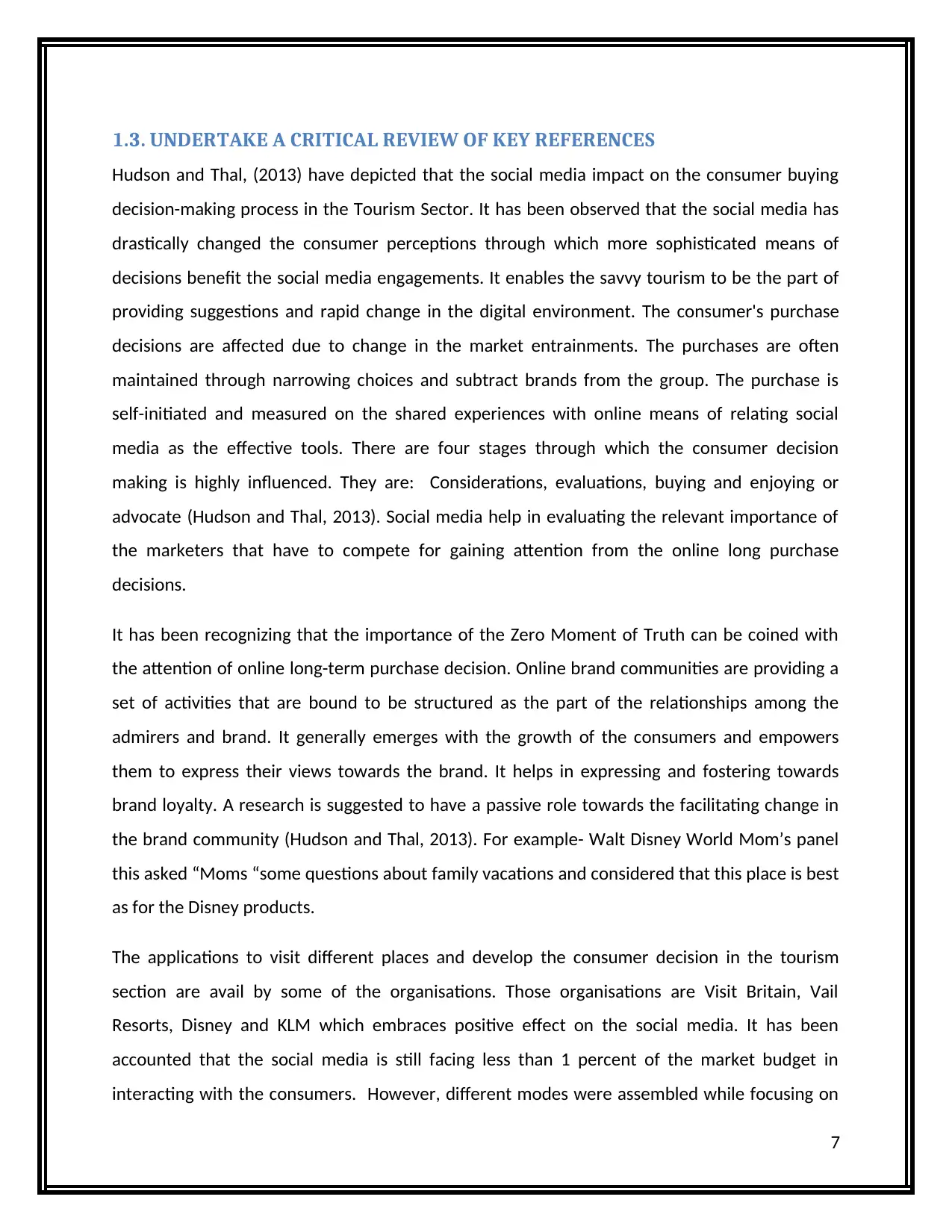
1.3. UNDERTAKE A CRITICAL REVIEW OF KEY REFERENCES
Hudson and Thal, (2013) have depicted that the social media impact on the consumer buying
decision-making process in the Tourism Sector. It has been observed that the social media has
drastically changed the consumer perceptions through which more sophisticated means of
decisions benefit the social media engagements. It enables the savvy tourism to be the part of
providing suggestions and rapid change in the digital environment. The consumer's purchase
decisions are affected due to change in the market entrainments. The purchases are often
maintained through narrowing choices and subtract brands from the group. The purchase is
self-initiated and measured on the shared experiences with online means of relating social
media as the effective tools. There are four stages through which the consumer decision
making is highly influenced. They are: Considerations, evaluations, buying and enjoying or
advocate (Hudson and Thal, 2013). Social media help in evaluating the relevant importance of
the marketers that have to compete for gaining attention from the online long purchase
decisions.
It has been recognizing that the importance of the Zero Moment of Truth can be coined with
the attention of online long-term purchase decision. Online brand communities are providing a
set of activities that are bound to be structured as the part of the relationships among the
admirers and brand. It generally emerges with the growth of the consumers and empowers
them to express their views towards the brand. It helps in expressing and fostering towards
brand loyalty. A research is suggested to have a passive role towards the facilitating change in
the brand community (Hudson and Thal, 2013). For example- Walt Disney World Mom’s panel
this asked “Moms “some questions about family vacations and considered that this place is best
as for the Disney products.
The applications to visit different places and develop the consumer decision in the tourism
section are avail by some of the organisations. Those organisations are Visit Britain, Vail
Resorts, Disney and KLM which embraces positive effect on the social media. It has been
accounted that the social media is still facing less than 1 percent of the market budget in
interacting with the consumers. However, different modes were assembled while focusing on
7
Hudson and Thal, (2013) have depicted that the social media impact on the consumer buying
decision-making process in the Tourism Sector. It has been observed that the social media has
drastically changed the consumer perceptions through which more sophisticated means of
decisions benefit the social media engagements. It enables the savvy tourism to be the part of
providing suggestions and rapid change in the digital environment. The consumer's purchase
decisions are affected due to change in the market entrainments. The purchases are often
maintained through narrowing choices and subtract brands from the group. The purchase is
self-initiated and measured on the shared experiences with online means of relating social
media as the effective tools. There are four stages through which the consumer decision
making is highly influenced. They are: Considerations, evaluations, buying and enjoying or
advocate (Hudson and Thal, 2013). Social media help in evaluating the relevant importance of
the marketers that have to compete for gaining attention from the online long purchase
decisions.
It has been recognizing that the importance of the Zero Moment of Truth can be coined with
the attention of online long-term purchase decision. Online brand communities are providing a
set of activities that are bound to be structured as the part of the relationships among the
admirers and brand. It generally emerges with the growth of the consumers and empowers
them to express their views towards the brand. It helps in expressing and fostering towards
brand loyalty. A research is suggested to have a passive role towards the facilitating change in
the brand community (Hudson and Thal, 2013). For example- Walt Disney World Mom’s panel
this asked “Moms “some questions about family vacations and considered that this place is best
as for the Disney products.
The applications to visit different places and develop the consumer decision in the tourism
section are avail by some of the organisations. Those organisations are Visit Britain, Vail
Resorts, Disney and KLM which embraces positive effect on the social media. It has been
accounted that the social media is still facing less than 1 percent of the market budget in
interacting with the consumers. However, different modes were assembled while focusing on
7
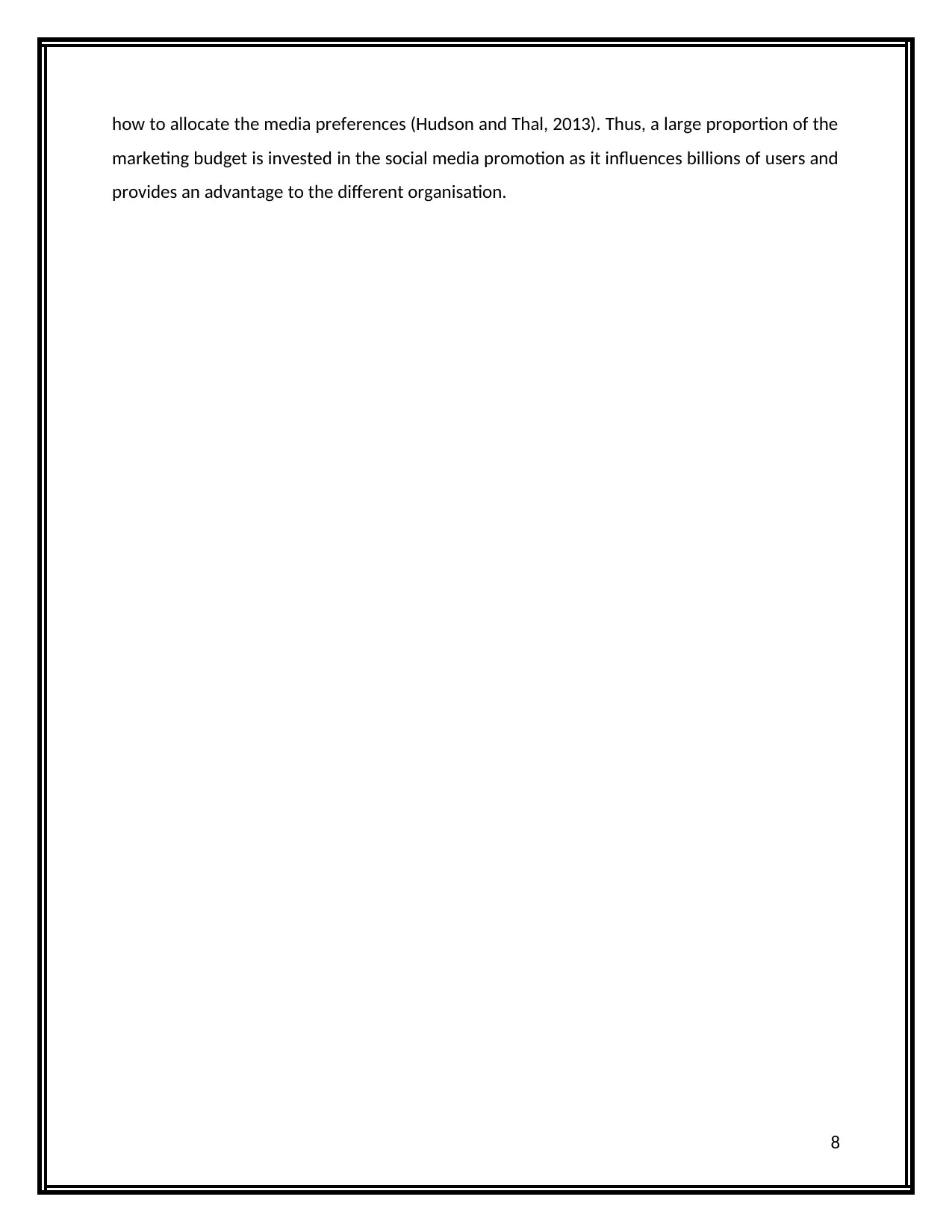
how to allocate the media preferences (Hudson and Thal, 2013). Thus, a large proportion of the
marketing budget is invested in the social media promotion as it influences billions of users and
provides an advantage to the different organisation.
8
marketing budget is invested in the social media promotion as it influences billions of users and
provides an advantage to the different organisation.
8
⊘ This is a preview!⊘
Do you want full access?
Subscribe today to unlock all pages.

Trusted by 1+ million students worldwide
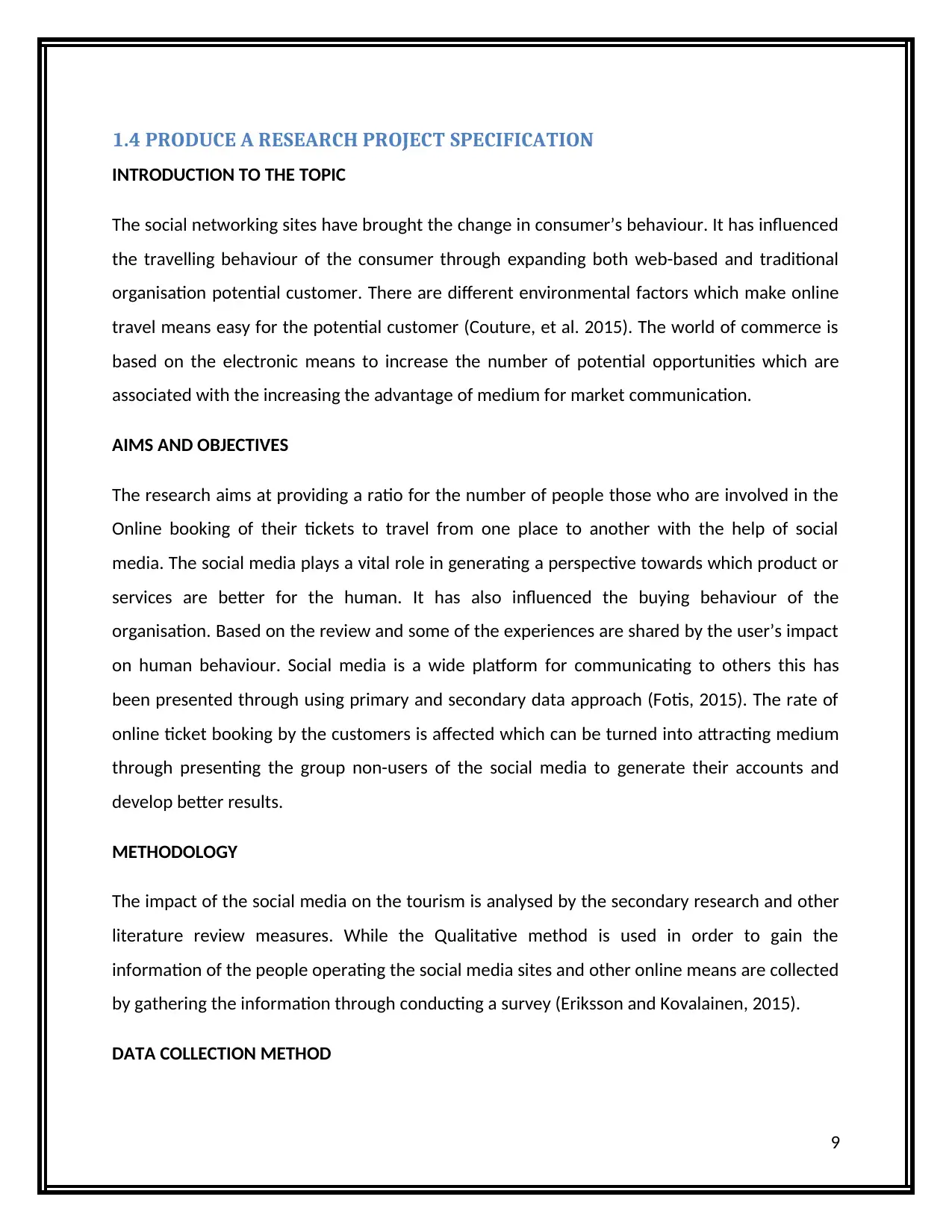
1.4 PRODUCE A RESEARCH PROJECT SPECIFICATION
INTRODUCTION TO THE TOPIC
The social networking sites have brought the change in consumer’s behaviour. It has influenced
the travelling behaviour of the consumer through expanding both web-based and traditional
organisation potential customer. There are different environmental factors which make online
travel means easy for the potential customer (Couture, et al. 2015). The world of commerce is
based on the electronic means to increase the number of potential opportunities which are
associated with the increasing the advantage of medium for market communication.
AIMS AND OBJECTIVES
The research aims at providing a ratio for the number of people those who are involved in the
Online booking of their tickets to travel from one place to another with the help of social
media. The social media plays a vital role in generating a perspective towards which product or
services are better for the human. It has also influenced the buying behaviour of the
organisation. Based on the review and some of the experiences are shared by the user’s impact
on human behaviour. Social media is a wide platform for communicating to others this has
been presented through using primary and secondary data approach (Fotis, 2015). The rate of
online ticket booking by the customers is affected which can be turned into attracting medium
through presenting the group non-users of the social media to generate their accounts and
develop better results.
METHODOLOGY
The impact of the social media on the tourism is analysed by the secondary research and other
literature review measures. While the Qualitative method is used in order to gain the
information of the people operating the social media sites and other online means are collected
by gathering the information through conducting a survey (Eriksson and Kovalainen, 2015).
DATA COLLECTION METHOD
9
INTRODUCTION TO THE TOPIC
The social networking sites have brought the change in consumer’s behaviour. It has influenced
the travelling behaviour of the consumer through expanding both web-based and traditional
organisation potential customer. There are different environmental factors which make online
travel means easy for the potential customer (Couture, et al. 2015). The world of commerce is
based on the electronic means to increase the number of potential opportunities which are
associated with the increasing the advantage of medium for market communication.
AIMS AND OBJECTIVES
The research aims at providing a ratio for the number of people those who are involved in the
Online booking of their tickets to travel from one place to another with the help of social
media. The social media plays a vital role in generating a perspective towards which product or
services are better for the human. It has also influenced the buying behaviour of the
organisation. Based on the review and some of the experiences are shared by the user’s impact
on human behaviour. Social media is a wide platform for communicating to others this has
been presented through using primary and secondary data approach (Fotis, 2015). The rate of
online ticket booking by the customers is affected which can be turned into attracting medium
through presenting the group non-users of the social media to generate their accounts and
develop better results.
METHODOLOGY
The impact of the social media on the tourism is analysed by the secondary research and other
literature review measures. While the Qualitative method is used in order to gain the
information of the people operating the social media sites and other online means are collected
by gathering the information through conducting a survey (Eriksson and Kovalainen, 2015).
DATA COLLECTION METHOD
9
Paraphrase This Document
Need a fresh take? Get an instant paraphrase of this document with our AI Paraphraser
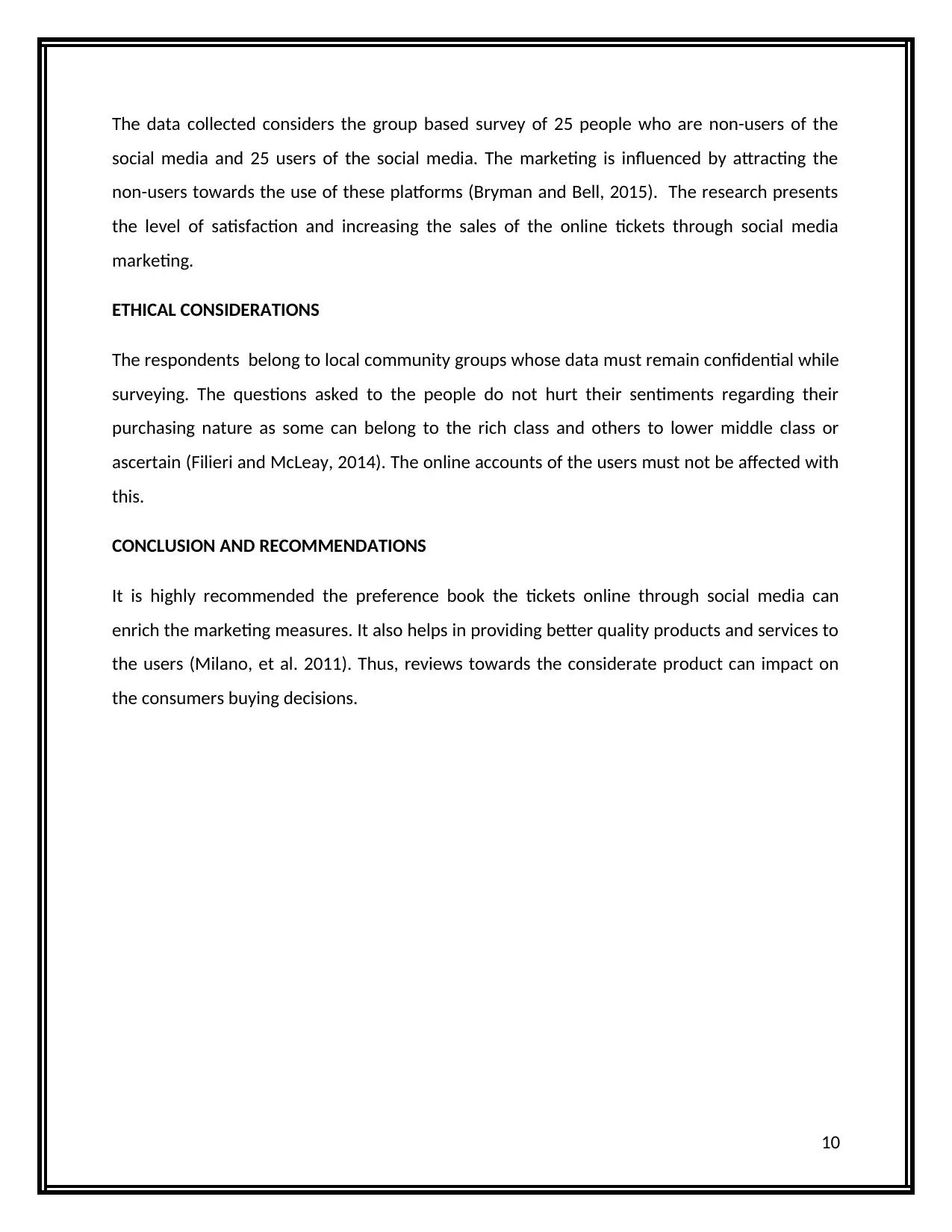
The data collected considers the group based survey of 25 people who are non-users of the
social media and 25 users of the social media. The marketing is influenced by attracting the
non-users towards the use of these platforms (Bryman and Bell, 2015). The research presents
the level of satisfaction and increasing the sales of the online tickets through social media
marketing.
ETHICAL CONSIDERATIONS
The respondents belong to local community groups whose data must remain confidential while
surveying. The questions asked to the people do not hurt their sentiments regarding their
purchasing nature as some can belong to the rich class and others to lower middle class or
ascertain (Filieri and McLeay, 2014). The online accounts of the users must not be affected with
this.
CONCLUSION AND RECOMMENDATIONS
It is highly recommended the preference book the tickets online through social media can
enrich the marketing measures. It also helps in providing better quality products and services to
the users (Milano, et al. 2011). Thus, reviews towards the considerate product can impact on
the consumers buying decisions.
10
social media and 25 users of the social media. The marketing is influenced by attracting the
non-users towards the use of these platforms (Bryman and Bell, 2015). The research presents
the level of satisfaction and increasing the sales of the online tickets through social media
marketing.
ETHICAL CONSIDERATIONS
The respondents belong to local community groups whose data must remain confidential while
surveying. The questions asked to the people do not hurt their sentiments regarding their
purchasing nature as some can belong to the rich class and others to lower middle class or
ascertain (Filieri and McLeay, 2014). The online accounts of the users must not be affected with
this.
CONCLUSION AND RECOMMENDATIONS
It is highly recommended the preference book the tickets online through social media can
enrich the marketing measures. It also helps in providing better quality products and services to
the users (Milano, et al. 2011). Thus, reviews towards the considerate product can impact on
the consumers buying decisions.
10
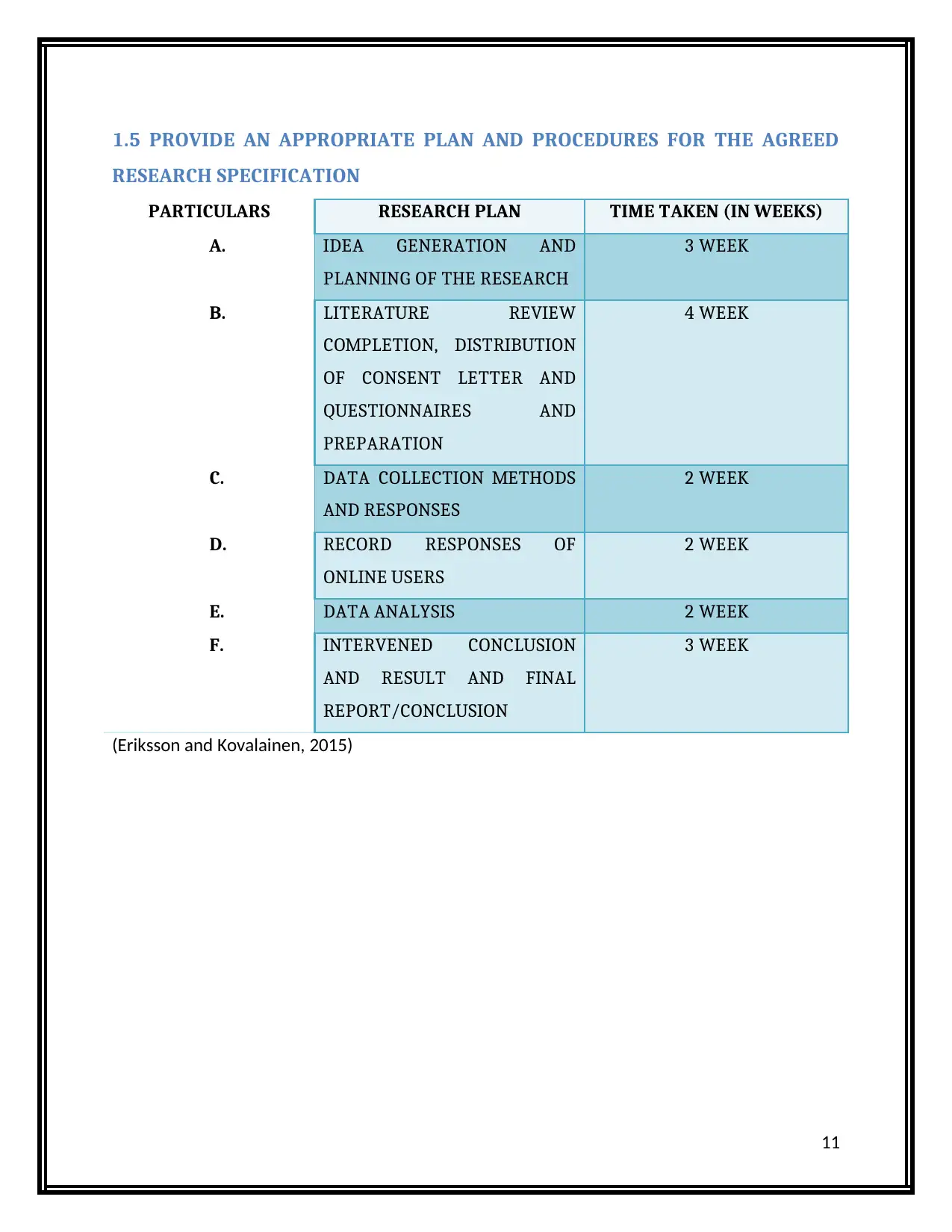
1.5 PROVIDE AN APPROPRIATE PLAN AND PROCEDURES FOR THE AGREED
RESEARCH SPECIFICATION
PARTICULARS RESEARCH PLAN TIME TAKEN (IN WEEKS)
A. IDEA GENERATION AND
PLANNING OF THE RESEARCH
3 WEEK
B. LITERATURE REVIEW
COMPLETION, DISTRIBUTION
OF CONSENT LETTER AND
QUESTIONNAIRES AND
PREPARATION
4 WEEK
C. DATA COLLECTION METHODS
AND RESPONSES
2 WEEK
D. RECORD RESPONSES OF
ONLINE USERS
2 WEEK
E. DATA ANALYSIS 2 WEEK
F. INTERVENED CONCLUSION
AND RESULT AND FINAL
REPORT/CONCLUSION
3 WEEK
(Eriksson and Kovalainen, 2015)
11
RESEARCH SPECIFICATION
PARTICULARS RESEARCH PLAN TIME TAKEN (IN WEEKS)
A. IDEA GENERATION AND
PLANNING OF THE RESEARCH
3 WEEK
B. LITERATURE REVIEW
COMPLETION, DISTRIBUTION
OF CONSENT LETTER AND
QUESTIONNAIRES AND
PREPARATION
4 WEEK
C. DATA COLLECTION METHODS
AND RESPONSES
2 WEEK
D. RECORD RESPONSES OF
ONLINE USERS
2 WEEK
E. DATA ANALYSIS 2 WEEK
F. INTERVENED CONCLUSION
AND RESULT AND FINAL
REPORT/CONCLUSION
3 WEEK
(Eriksson and Kovalainen, 2015)
11
⊘ This is a preview!⊘
Do you want full access?
Subscribe today to unlock all pages.

Trusted by 1+ million students worldwide
1 out of 31
Related Documents
Your All-in-One AI-Powered Toolkit for Academic Success.
+13062052269
info@desklib.com
Available 24*7 on WhatsApp / Email
![[object Object]](/_next/static/media/star-bottom.7253800d.svg)
Unlock your academic potential
Copyright © 2020–2026 A2Z Services. All Rights Reserved. Developed and managed by ZUCOL.





